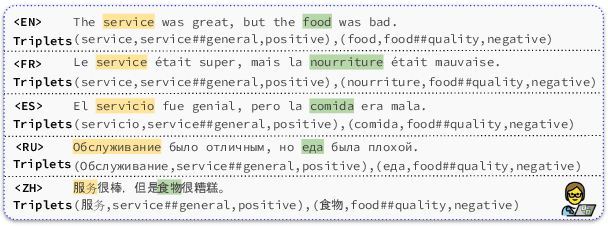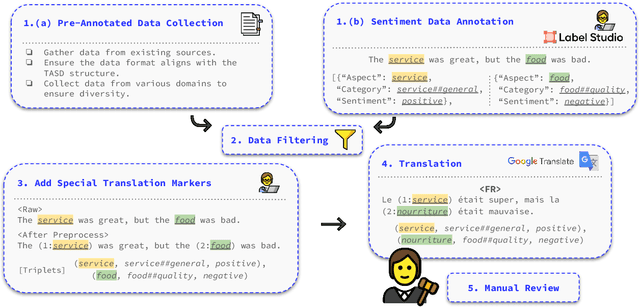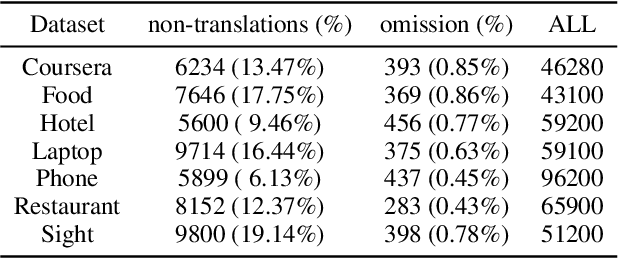Bolei Ma
The Imperfective Paradox in Large Language Models
Jan 14, 2026Abstract:Do Large Language Models (LLMs) genuinely grasp the compositional semantics of events, or do they rely on surface-level probabilistic heuristics? We investigate the Imperfective Paradox, a logical phenomenon where the past progressive aspect entails event realization for activities (e.g., running $\to$ ran) but not for accomplishments (e.g., building $\nrightarrow$ built). We introduce ImperfectiveNLI, a diagnostic dataset designed to probe this distinction across diverse semantic classes. Evaluating state-of-the-art open-weight models, we uncover a pervasive Teleological Bias: models systematically hallucinate completion for goal-oriented events, often overriding explicit textual negation. Representational analyses show that while internal embeddings often distinguish process from result, inference decisions are dominated by strong priors about goal attainment. We further find that prompting-based interventions reduce hallucinated completions but also increase incorrect rejections of valid entailments. Our findings suggest that current LLMs lack structural aspectual awareness, operating as predictive narrative engines rather than faithful logical reasoners.
Moral Lenses, Political Coordinates: Towards Ideological Positioning of Morally Conditioned LLMs
Jan 13, 2026Abstract:While recent research has systematically documented political orientation in large language models (LLMs), existing evaluations rely primarily on direct probing or demographic persona engineering to surface ideological biases. In social psychology, however, political ideology is also understood as a downstream consequence of fundamental moral intuitions. In this work, we investigate the causal relationship between moral values and political positioning by treating moral orientation as a controllable condition. Rather than simply assigning a demographic persona, we condition models to endorse or reject specific moral values and evaluate the resulting shifts on their political orientations, using the Political Compass Test. By treating moral values as lenses, we observe how moral conditioning actively steers model trajectories across economic and social dimensions. Our findings show that such conditioning induces pronounced, value-specific shifts in models' political coordinates. We further notice that these effects are systematically modulated by role framing and model scale, and are robust across alternative assessment instruments instantiating the same moral value. This highlights that effective alignment requires anchoring political assessments within the context of broader social values including morality, paving the way for more socially grounded alignment techniques.
Do Large Language Models Think Like the Brain? Sentence-Level Evidence from fMRI and Hierarchical Embeddings
May 28, 2025Abstract:Understanding whether large language models (LLMs) and the human brain converge on similar computational principles remains a fundamental and important question in cognitive neuroscience and AI. Do the brain-like patterns observed in LLMs emerge simply from scaling, or do they reflect deeper alignment with the architecture of human language processing? This study focuses on the sentence-level neural mechanisms of language models, systematically investigating how hierarchical representations in LLMs align with the dynamic neural responses during human sentence comprehension. By comparing hierarchical embeddings from 14 publicly available LLMs with fMRI data collected from participants, who were exposed to a naturalistic narrative story, we constructed sentence-level neural prediction models to precisely identify the model layers most significantly correlated with brain region activations. Results show that improvements in model performance drive the evolution of representational architectures toward brain-like hierarchies, particularly achieving stronger functional and anatomical correspondence at higher semantic abstraction levels.
Multimodal Emotion Recognition in Conversations: A Survey of Methods, Trends, Challenges and Prospects
May 26, 2025Abstract:While text-based emotion recognition methods have achieved notable success, real-world dialogue systems often demand a more nuanced emotional understanding than any single modality can offer. Multimodal Emotion Recognition in Conversations (MERC) has thus emerged as a crucial direction for enhancing the naturalness and emotional understanding of human-computer interaction. Its goal is to accurately recognize emotions by integrating information from various modalities such as text, speech, and visual signals. This survey offers a systematic overview of MERC, including its motivations, core tasks, representative methods, and evaluation strategies. We further examine recent trends, highlight key challenges, and outline future directions. As interest in emotionally intelligent systems grows, this survey provides timely guidance for advancing MERC research.
Multi-Scale and Multi-Objective Optimization for Cross-Lingual Aspect-Based Sentiment Analysis
Feb 19, 2025Abstract:Aspect-based sentiment analysis (ABSA) is a sequence labeling task that has garnered growing research interest in multilingual contexts. However, recent studies lack more robust feature alignment and finer aspect-level alignment. In this paper, we propose a novel framework, Multi-Scale and Multi-Objective optimization (MSMO) for cross-lingual ABSA. During multi-scale alignment, we achieve cross-lingual sentence-level and aspect-level alignment, aligning features of aspect terms in different contextual environments. Specifically, we introduce code-switched bilingual sentences into the language discriminator and consistency training modules to enhance the model's robustness. During multi-objective optimization, we design two optimization objectives: supervised training and consistency training, aiming to enhance cross-lingual semantic alignment. To further improve model performance, we incorporate distilled knowledge of the target language into the model. Results show that MSMO significantly enhances cross-lingual ABSA by achieving state-of-the-art performance across multiple languages and models.
M-ABSA: A Multilingual Dataset for Aspect-Based Sentiment Analysis
Feb 17, 2025



Abstract:Aspect-based sentiment analysis (ABSA) is a crucial task in information extraction and sentiment analysis, aiming to identify aspects with associated sentiment elements in text. However, existing ABSA datasets are predominantly English-centric, limiting the scope for multilingual evaluation and research. To bridge this gap, we present M-ABSA, a comprehensive dataset spanning 7 domains and 21 languages, making it the most extensive multilingual parallel dataset for ABSA to date. Our primary focus is on triplet extraction, which involves identifying aspect terms, aspect categories, and sentiment polarities. The dataset is constructed through an automatic translation process with human review to ensure quality. We perform extensive experiments using various baselines to assess performance and compatibility on M-ABSA. Our empirical findings highlight that the dataset enables diverse evaluation tasks, such as multilingual and multi-domain transfer learning, and large language model evaluation, underscoring its inclusivity and its potential to drive advancements in multilingual ABSA research.
Pragmatics in the Era of Large Language Models: A Survey on Datasets, Evaluation, Opportunities and Challenges
Feb 17, 2025Abstract:Understanding pragmatics-the use of language in context-is crucial for developing NLP systems capable of interpreting nuanced language use. Despite recent advances in language technologies, including large language models, evaluating their ability to handle pragmatic phenomena such as implicatures and references remains challenging. To advance pragmatic abilities in models, it is essential to understand current evaluation trends and identify existing limitations. In this survey, we provide a comprehensive review of resources designed for evaluating pragmatic capabilities in NLP, categorizing datasets by the pragmatics phenomena they address. We analyze task designs, data collection methods, evaluation approaches, and their relevance to real-world applications. By examining these resources in the context of modern language models, we highlight emerging trends, challenges, and gaps in existing benchmarks. Our survey aims to clarify the landscape of pragmatic evaluation and guide the development of more comprehensive and targeted benchmarks, ultimately contributing to more nuanced and context-aware NLP models.
Correcting Annotator Bias in Training Data: Population-Aligned Instance Replication (PAIR)
Jan 12, 2025Abstract:Models trained on crowdsourced labels may not reflect broader population views when annotator pools are not representative. Since collecting representative labels is challenging, we propose Population-Aligned Instance Replication (PAIR), a method to address this bias through statistical adjustment. Using a simulation study of hate speech and offensive language detection, we create two types of annotators with different labeling tendencies and generate datasets with varying proportions of the types. Models trained on unbalanced annotator pools show poor calibration compared to those trained on representative data. However, PAIR, which duplicates labels from underrepresented annotator groups to match population proportions, significantly reduces bias without requiring new data collection. These results suggest statistical techniques from survey research can help align model training with target populations even when representative annotator pools are unavailable. We conclude with three practical recommendations for improving training data quality.
Algorithmic Fidelity of Large Language Models in Generating Synthetic German Public Opinions: A Case Study
Dec 17, 2024Abstract:In recent research, large language models (LLMs) have been increasingly used to investigate public opinions. This study investigates the algorithmic fidelity of LLMs, i.e., the ability to replicate the socio-cultural context and nuanced opinions of human participants. Using open-ended survey data from the German Longitudinal Election Studies (GLES), we prompt different LLMs to generate synthetic public opinions reflective of German subpopulations by incorporating demographic features into the persona prompts. Our results show that Llama performs better than other LLMs at representing subpopulations, particularly when there is lower opinion diversity within those groups. Our findings further reveal that the LLM performs better for supporters of left-leaning parties like The Greens and The Left compared to other parties, and matches the least with the right-party AfD. Additionally, the inclusion or exclusion of specific variables in the prompts can significantly impact the models' predictions. These findings underscore the importance of aligning LLMs to more effectively model diverse public opinions while minimizing political biases and enhancing robustness in representativeness.
Evaluating Zero-Shot Multilingual Aspect-Based Sentiment Analysis with Large Language Models
Dec 17, 2024



Abstract:Aspect-based sentiment analysis (ABSA), a sequence labeling task, has attracted increasing attention in multilingual contexts. While previous research has focused largely on fine-tuning or training models specifically for ABSA, we evaluate large language models (LLMs) under zero-shot conditions to explore their potential to tackle this challenge with minimal task-specific adaptation. We conduct a comprehensive empirical evaluation of a series of LLMs on multilingual ABSA tasks, investigating various prompting strategies, including vanilla zero-shot, chain-of-thought (CoT), self-improvement, self-debate, and self-consistency, across nine different models. Results indicate that while LLMs show promise in handling multilingual ABSA, they generally fall short of fine-tuned, task-specific models. Notably, simpler zero-shot prompts often outperform more complex strategies, especially in high-resource languages like English. These findings underscore the need for further refinement of LLM-based approaches to effectively address ABSA task across diverse languages.
 Add to Chrome
Add to Chrome Add to Firefox
Add to Firefox Add to Edge
Add to Edge